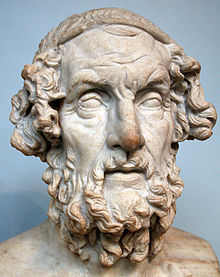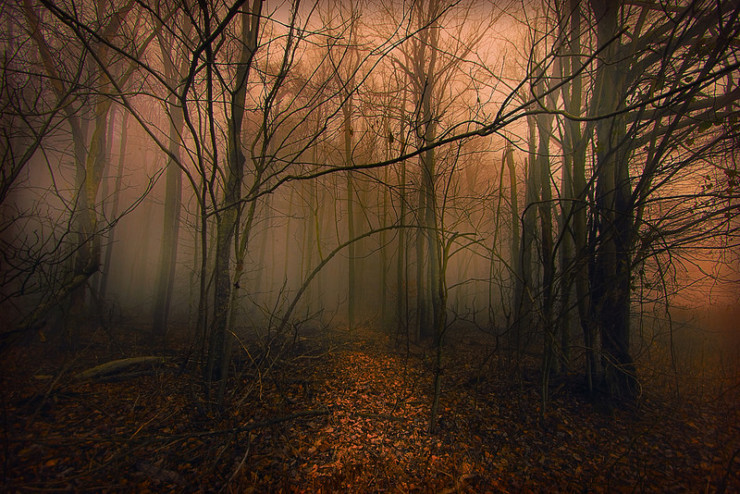The Odyssey by Homer is the second oldest book in the Western literary canon; Homer’s The Iliad wins the prize for the oldest. The works are believed to have been written sometime about the end of the 8th century B.C. (or B.C.E., if you prefer). They describe the fall of the great city of Troy and its aftermath, which occurred about 400 years earlier. (Two scholarly camps argue about the identity of Homer; one says he is a single individual and the other says he is actually a group of individuals.) (For our purposes, we assume he is one person.)
The two works give us innumerable images and metaphors. The face that launched a thousand ships. The Trojan horse. Achilles’ heel. The judgment of Paris. The sirens’ song. The Cyclops. Circe the witch. Scylla and Charybdis.
The Odyssey (Robert Fitzgerald translation) was the source for the prompts for Tweetspeak Poetry’s most recent poetry party on Twitter, held Dec. 10, where 10 would-be Homers wrote their own epic poems.
If you’re not familiar with how our Twitter poetry parties work, it’s a relatively simple process. For one hour, a prompt is given every so often, and participants respond to the prompt and each other with a line or a verse, always using the #tsptry hashtag (so your tweets show up on the hashtag stream and so we can find them afterward). The tweets are compiled and edited into poems.
And here we go with Part 1 of the poems compiled from the party. Part 2 will post tomorrow.
The Odyssey of the Wooded Isle
By @Doallas, @lauralynn_brown, @llbarkat, @lwlindquist, @SoniaJoie, @lanearnold, @SandraHeskaKing, @pathoftreasure, @BethanyR_, and @Nelronnie. Edited by @gyoung9751.
Sing in me, Muse

A Hellenized version of what Homer looked like
Sing in me, Muse, and through me
tell the story of two lovers
and snow and music.
A wooded island, in the sea’s middle,
moonlight like a lash.
Take me to that island, Muse,
row me in your dory,
swim to the middle of the wood,
telling the story of music, of snow lashes,
of doors, and how he came,
yet not on some white steed,
for this is no fairy tale,
but instead kissed by the stars,
omens being what you make of them.
Swim he did, snow on his lashes.
He arrived dripping, and ready
on the island of moonlight
sinking to silver snow.
Silver on his fingers, raspberry in his bowl,
raspberry on his fingers, gold on his tongue,
And to be and to be.
Silver, ready, sipping persimmon,
he bore a bowl filled with moonlight
Wait, it was persimmon?
It was the raspberry, lashed
behind the wooden door.
And on his tongue, the stars,
his fingers dripping with silver,
his soul lashed with moonlight,
his breath tripping silver moonlight.
Write another story
for this night of stars,
making jewels of the brightest.
Beautiful sandals
She bent to tie
her beautiful sandals,
ambrosial, golden,
golden sandals from beneath
a hem of cinnamon
that warms to his touch,
sandals fit for a princess, yet
she was not.
Words lift in the gentle breeze,
turn into stars, and bear dragonflies
past the Milky Way, golden dust
drifting from their wings,
light spilling like silver coins.
Golden raspberries scatter the ground.
She bent beneath the breeze and asked:
what brings you to my wooded isle?
The oath
I come to your island
in search of the silver bowl
filled with ruby raspberries
I am old enough to know a sign
when I see one slipped before
me. Mine is the poet’s oath,
to scatter the ground with poetry,
weaving to the music of the grass.
And so I promise purple clusters.
That is also my oath.
And mine, I promise
is yours by morning
(an oath she spoke in sugar tones,
vowing violets to the stars).
Ay, row the dory along,
toward yonder island
free of oaths and oafs and oars,
Oafs with oars,
fools with gold,
and you.
Oafs do have their uses
but none like fools.
What are oaths
without the persimmon?
In the morning,
will a persimmon oath
be still as sweet?
This island isn’t big enough
for both our oaths.
Golden fountain
They raced to the golden fountain,
whose water makes words immortal.
They carried a golden wand,
for stirring in the golden fountain
for stirring words in the golden fountain.
Dragonfly mornings
Follow the dragonflies home,
carried on those dragonfly mornings
bursting purple in the sun.
Do you hear the dragonfly’s ballad
trailing across the wooden isle?
Who dwells there?
Will none so much as take me?
I will take you to the wooded isle,
on our way back home.
Promise me only shells, and
we are on our way.
Silver bowls
No: I can never give the word for this
night gone begging, this
night old enough to know
the meaning of empty silver bowls.
We heard the music of the silver bowls,
night after night, night gone begging
with empty silver bowls.
Scarce the moments, could fill
the bowls of silver.
If I beg with a silver bowl,
will you fill it with your golden words,
golden words stung like bees?
Off this isle I’d rather be buried
bearing silver.
Fill the dory, then,
with empty silver bowls.
Some must sing
their own song of silver.
No: I can never give the word for this.
Black poplar and shells
Back to the wooded isle, we left it,
abandoned, shells of what we were.
In the inner wood, I clutch the black poplar,
black poplar, pungent cypress,
black poplar, purple clusters of porpoises.
The persimmon and promise abandoned,
I flee to the shade of the poplar,
far away from empty oaths.
My back is to the black poplar.
And the shell is the memory
of longer days
And the shell is the memory
of longer days dwelling
all night near
you.
Fill my alabaster shell;
string my neck with alabaster.
The silver wand now alabaster,
now gold.
What alchemy is this?
Photo by Donnie Nunley, Creative Commons, via Flickr. Post by Glynn Young, author of the novels Dancing Priest and A Light Shining, and Poetry at Work.
__________________________

“I require all our incoming poetry students—in the MFA I direct—to buy and read this book.”
—Jeanetta Calhoun Mish
- Poets and Poems: Sandra Marchetti and “Diorama” - April 24, 2025
- Poets and Poems: Christina Cook and “Roaming the Labyrinth” - April 22, 2025
- Longfellow’s “Paul Revere’s Ride”: Creating a National Legend - April 17, 2025

L.L. Barkat says
These are just so delicious! Thank you for weaving silver, gold, isles, and bowls. 🙂
Will Willingham says
Glynn, thanks for this. Always such fun to see what comes of all that wild chaos on Twitter. These are really beautiful and fun. 🙂
Glynn says
That Homer was clearly a great inspiration!
Maureen says
Fun to see how you incorporated my tweets. And I love that you created a wholly new narrative that leaves us to wonder what Part 2 brings. Great job!
Glynn says
Thanks, Maureen! But I had some great material to work with.
SimplyDarlene says
My firstever logging in to Twitter was to create an account several years ago for one of these Twitter parties. I was emailing Sandra on the side askin things like, “What do I do?” & “Where do I go?” & “Am I here? Have I arrived?” & “Do you see me?” It was wild and weird. And, I liked it. (I’m sure Sandra was thrilled to have me prodding her in the midst of the frenzied typing.)
Because of the surprise, simplicity, and imagery, these are my favorite bits from your recent poetical shindig:
Swim to the middle of the wood.
His fingers dripping with silver.
Night after night gone begging.
Glynn says
Darlene – I had an embarrassment of riches here – there were a boatload of great lines to work with.
Will Willingham says
A whole dory, of course.
Prasanta says
I love how you wove all these tweets together! It was so much fun to participate. 🙂
Bethany says
Glynn, I’m amazed at how you took the lines-from-everywhere and shaped them into this rich tapestry. I’m looking forward to Part 2.
Nelly Vega-Sorensen says
I really enjoyed participating and now seeing how the lines were so creatively put together,,, excellent!